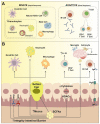The Immune System through the Lens of Alcohol Intake and Gut Microbiota
- PMID: 34299105
- PMCID: PMC8303153
- DOI: 10.3390/ijms22147485
The Immune System through the Lens of Alcohol Intake and Gut Microbiota
Abstract
The human gut is the largest organ with immune function in our body, responsible for regulating the homeostasis of the intestinal barrier. A diverse, complex and dynamic population of microorganisms, called microbiota, which exert a significant impact on the host during homeostasis and disease, supports this role. In fact, intestinal bacteria maintain immune and metabolic homeostasis, protecting our organism against pathogens. The development of numerous inflammatory disorders and infections has been linked to altered gut bacterial composition or dysbiosis. Multiple factors contribute to the establishment of the human gut microbiota. For instance, diet is considered as one of the many drivers in shaping the gut microbiota across the lifetime. By contrast, alcohol is one of the many factors that disrupt the proper functioning of the gut, leading to a disruption of the intestinal barrier integrity that increases the permeability of the mucosa, with the final result of a disrupted mucosal immunity. This damage to the permeability of the intestinal membrane allows bacteria and their components to enter the blood tissue, reaching other organs such as the liver or the brain. Although chronic heavy drinking has harmful effects on the immune system cells at the systemic level, this review focuses on the effect produced on gut, brain and liver, because of their significance in the link between alcohol consumption, gut microbiota and the immune system.
Keywords: alcohol; brain; dysbiosis; gut; immune system; liver; microbiota.
Conflict of interest statement
The authors declare no conflict of interest.
Figures




